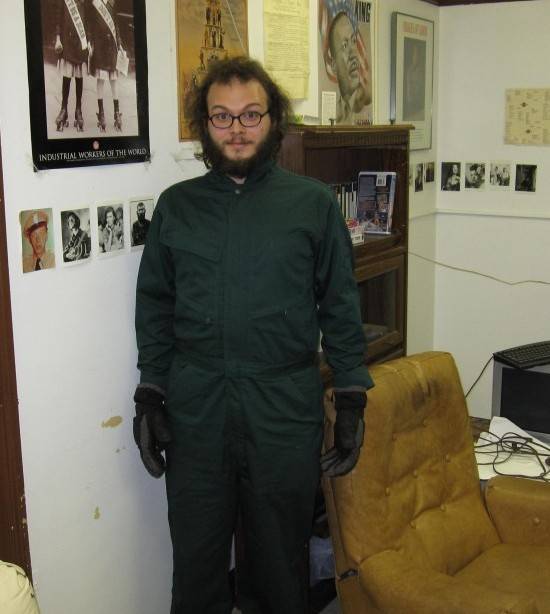
The School for Designing a Society is not like Fight Club. In fact, it’s nearly its opposite. The first rule is that you talk about it, “it” being what you want your society to look like. “It’s a lot of conversations with people,” explains Jacob Barton, who’s the school’s AmeriCorps staffer this year. The School is located, more or less, at the Urbana-Champaign Independent Media Center.
I imagine these conversations are utopian, inspiring, and sometimes frustratingly abstract, much like the 20-minute conversation that Jacob and I had last weekend.
According to the School’s website, “The School for Designing a Society, established in 1991, is a project of teachers, performers, artists, and activists. It is an ongoing experiment in making temporary living environments where the question ‘What would I consider a desirable society?’ is given serious playful thought, and taken as an input to creative projects.”
Barton elaborated, “One main thing is that the design aspect of designing a society is always linked to desire, what people want. You come to the table and I ask, ‘What do you want? What’s bugging you about this society?’ And that’s what I think keeps me coming back.”
In 2005, Barton first became involved with the School while he was a composition student at Rice University in Houston, Texas. “I heard about this thing and I thought it sounded weird, and wonderful. It was at the Gesundheit summer institute [Gesundheit and the School are affiliated with one another]. That was my introduction to any kind of counterculture, or global resistance or global justice movements, and alternative models of society.”
In 2007, the Virginia Beach native graduated from Rice and moved to Champaign-Urbana to take part more fully in the School. “I’m treating School for Designing a Society like grad school, and I’m transitioning to being a teacher [for the School],” he explained. Now, in his role as an AmeriCorps staffer, he’s been able to take some of the administrative load off of the four existing teachers.
“The work of teaching has never been separated from the work of organizing,” Barton said, “so the teachers have never had the liberty of not worrying about how to get the students to come. There’s sort of this back and forth between the administrative role of, “Let’s get some dates nailed down,” and the teaching responds creatively with some sort of lesson. I’ve slowly been taking over the administrative role, which is interesting for me, because that’s what I hadn’t done before.
“I’m working right now on what the shape of the Fall 2010 is going to look like,” he continued, “and try some new things with it. I’m trying to make a variety of things happen, that matches the variety of people that will want to come to it. It’s not always that somebody’s making something happen, so you have to keep feeding it.”
Barton’s also a founder of Oddmusic, and he’ll actually be performing at the IMC tonight at 8 p.m., performing on his Udderbot and opening for performance artist Rebecca Nagle. “I think of Oddmusic as a project that Andrew and I started to test some of the ideas that we had in School for Designing a Society,” Barton said. “There’s a recognition that you need new forms, and that the old forms aren’t going to be good enough. So we want to invent instruments, and we have this thing that’s a library of musical instruments, and there aren’t really libraries of musical instruments anywhere, so that’s an innovation.
He’s aware that doing something innovative is not always immediately successful. “Oddmusic has been difficult to get off of the ground,” Barton conceded. “It’s something that we’re thinking about with a critical eye… ear… brain.”
Barton also has done a lot of thinking about how the School and the IMC are structured. He said, “At the IMC, we take these old notions of work and supervision, and we try to play off of them in an organization that’s an anarchic model of autonomy everywhere. So, I’ll catch myself saying something that’s turning someone else into my boss, like, I’ll take what you say and run with it for a while, and maybe that’s not what the situation needed. It needed me to stand up and say, ‘No, that’s a bad idea! And I’m doing the work, so I should decide.’ Just a lot of feeling it out that way. Just a unique situation and a unique opportunity, and I’m glad to have it.”
——
This article is part of a series profiling the UC-IMC’s AmeriCorps volunteers. Previous entries include:








